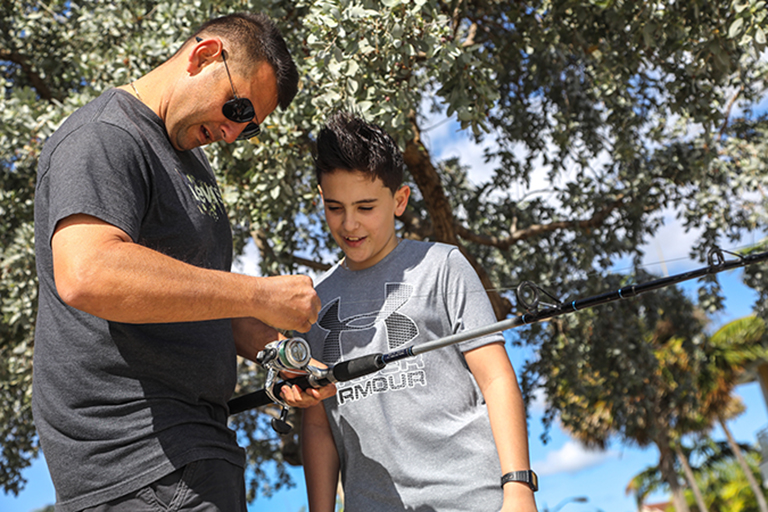- Behavior
- Parenting
- Safety
How to conquer teen boredom during prolonged crisis at home

In this article, you’ll find answers to questions like:
1. How do we find common ground?
2. When do we give each other space?
3. What role can technology play?
When a prolonged crisis, such as a pandemic or hurricane, strips away familiar forms of recreation and socialization, you may find yourself the sole company for your preteen or teenager. Limited access to friends, sports and entertainment means that you and your child must figure out how to pass all the time together.
Our local experts share ways below to navigate this situation, which forces you to slow down and engage.
1. HOW DO WE FIND COMMON GROUND?
It can be challenging to relate to a child with friends, interests and hobbies that are very different from yours. So try to discover what you have in common, says Michelle Rodriguez, interim supervisor for the Positive Parenting Program, known as Triple P, at the Center for Family Services of Palm Beach County.
“I advise my clients to find ways to challenge their teens by asking them what they want to do that they’ve never done before. What are their interests? What do they care about? Challenge them to come up with activities that you can do together. You, as the parent, don’t always have to come up with the ideas,” she says.
Using simple icebreakers, such as playing board games or cards, walking or going for a car or bike ride to their destination of choice, says Nityia Lathan, Triple P supervisor at Community Partners of South Florida. If your teen is involved in organized sports, ask them teach you some basics, like how to field a ground ball, while getting exercise.
2. WHEN DO WE GIVE EACH OTHER SPACE?
Disruption of routines can spark anxieties and frustrations. So Rodriguez recommends empathy, compassion and a cool-off period before discussing what triggered the tension when you’re calmer.
“Remember that teenagers deal with crisis in their own way. Especially for preteens, they may feel like this is the worst that they can’t hang out with their friends,” Rodriguez says. “For parents, it’s a matter of providing structure, giving their child a sense of control and involving them in the process of doing things at home.”
To accomplish that, work out a home schedule for chores, fun activities, class time and homework. Lathan also suggests designating when to spend time together and alone.
3. WHAT ROLE DOES TECHNOLOGY PLAY?
Your child most likely will want to connect with friends through social media, interactive video games and videoconferencing via FaceTime or Zoom. If you want to monitor it, you can designate a common area for this, such as the living room or dining room.
You can use the common area yourself for virtual support via telehealth counseling sessions, Zoom calls with your friends and watching shows to model self-care.
“We teach our child with our behaviors. They watch everything we do, and they start to mimic it. I tell the parents that an emergency is a perfect opportunity for you to talk to your children,” Rodriguez says. “But above all else, give yourself a break. We don’t have to be in crisis mode all day long. Ask your teenager, ‘What is a good thing that has come out of this emergency?’ Help them remember that it has not been all bad.”
SOURCES:
• Michelle Rodriguez, Triple P interim supervisor, Center for Family Services of Palm Beach County
• Nityia Lathan, Triple P supervisor, Community Partners of South Florida
You May Also Like
-
- Behavior
- Health
- Parenting
Should I worry my moody teen is sulking too long? Find out here
Periods of teenage angst typically last a few days. However, chronic or prolonged behavioral and mood changes can indicate a mental health concern. If you're concerned about your t …
Read More -
- Behavior
- Health
- Parenting
Don’t wait until the teen years to discuss drugs and alcohol
Your kids are listening. So now's a great time to talk to them about drugs and alcohol in an age-appropriate way. Read on for more advice from our local experts. …
Read More -
- Behavior
- Health
- Parenting
Don't sweat it: Let us guide you on the sex talk with your teen
It’s best to listen first before answering questions about sex and gender identity. Read on for more tips and advice from our local experts on how to make these topics easier and l …
Read More
Related resources
-
- Behavior
- Parenting
Center for Family Services of Palm Beach County
Positive Parenting Program, known as Triple P, offers free seminars and one-on-one guidance to help families improve the parent-child relationship
561-616-1222 Website Email -
- Behavior
- Parenting
Community Partners
Positive Parenting Program, known as Triple P — free seminars and one-on-one guidance to help families improve their parent-child relationships
561-841-3500 Website Email -
- Behavior
- Health
- Other
Mental Health America of the Palm Beaches
Based in West Palm Beach, local information and services related to mental health, including support groups, referrals and an online screening test.
561-832-3755 Website Email -
- Behavior
- Education
- Parenting
Palm Beach County Behavioral Health Coalition
Local information, events and support for parents and youth to live free of drugs, alcohol and tobacco
561-374-7627 Website Email
